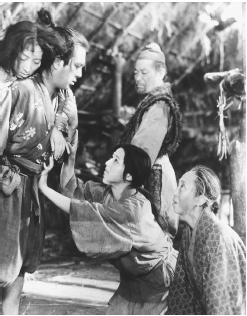 Japanese cinema is for the most part ahistorical. Like Hong Kong cinema (and unlike the movies of mainland China and Taiwan), Japanese cinema does not treat history as a set of episodes as much as a template; it's unsurprising that both Hong Kong and Japan should have produced so many films that treat history like little more than a colorful wardrobe full of astounding swords and costumes (Japan's pulpier Samurai films, especially the color ones; Hong Kong's kung-fu flicks).
Japanese cinema is for the most part ahistorical. Like Hong Kong cinema (and unlike the movies of mainland China and Taiwan), Japanese cinema does not treat history as a set of episodes as much as a template; it's unsurprising that both Hong Kong and Japan should have produced so many films that treat history like little more than a colorful wardrobe full of astounding swords and costumes (Japan's pulpier Samurai films, especially the color ones; Hong Kong's kung-fu flicks).The majority of Japanese historical films are built around a simple conceit: there are universal human themes, and the reason we should explore history in cinema is because certain eras make it easier to illustrate on these themes; the past does not seem to have us for a future, but rather exists as an unchanging era full of as many possibilities as the present--a sort of alternate present. The Chinese / Taiwanese viewpoint sees history as composed of irreconcilable episodes that we must attempt to explore regardless of our own distance from them, as giving them meaning creates the possibility of giving meaning to our own era (a sort of reverse-historicizing of the present); these episodes are also visibly finite, and we accept them as being our past.
Kenji Mizoguchi's "historical" films are quintessentially Japanese in this respect, as are the films of Akira Kurosawa, but, unlike Kurosawa, there's a strain of context in Mizoguchi's work--a sense, if not of time and place, then at least of order. Sansho Dayu contains some of the greatest dissolves in film, and (especially at the beginning of the film) they create a sense of flow--the scenes of the film do not seem to be cobbled together from several concurrent presents, but rather as a single long experience.

No comments:
Post a Comment